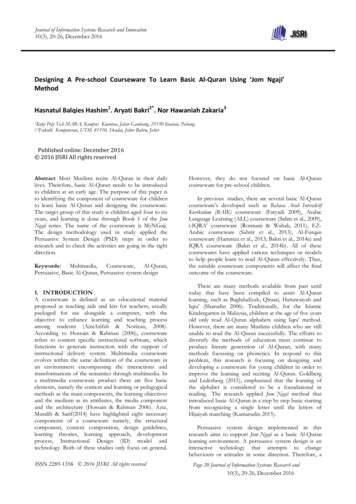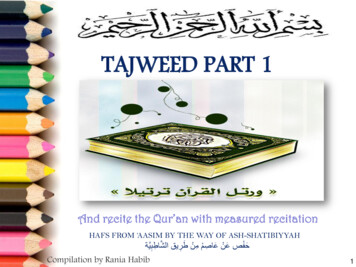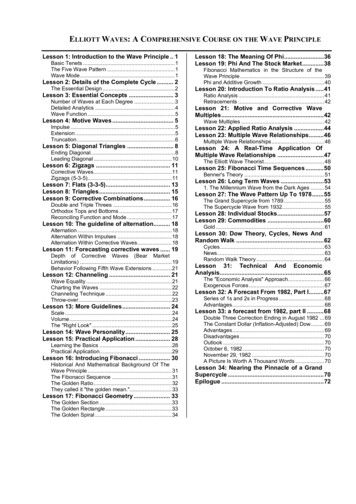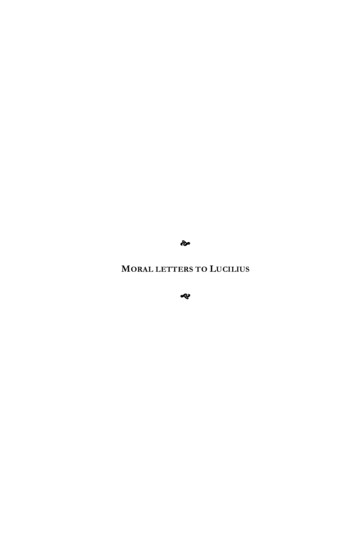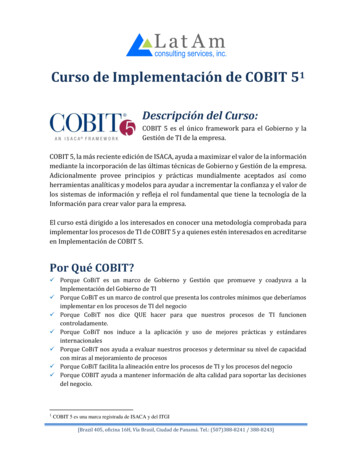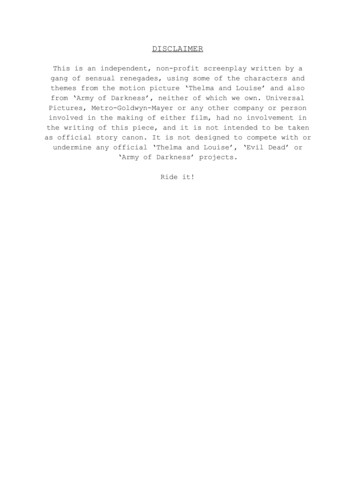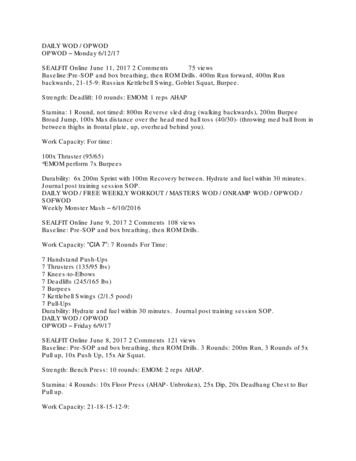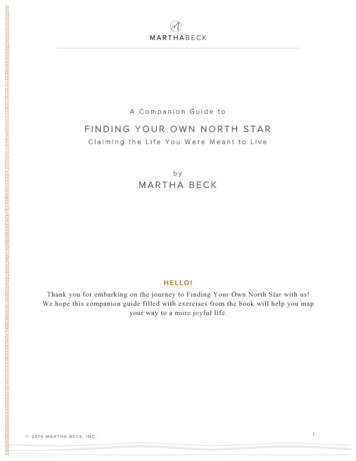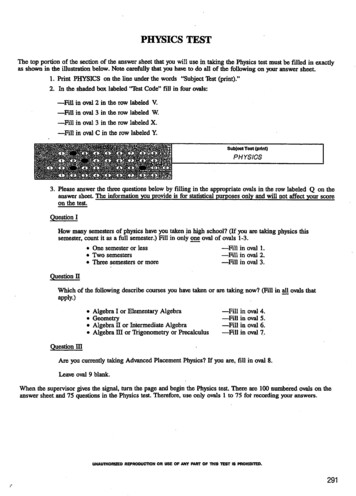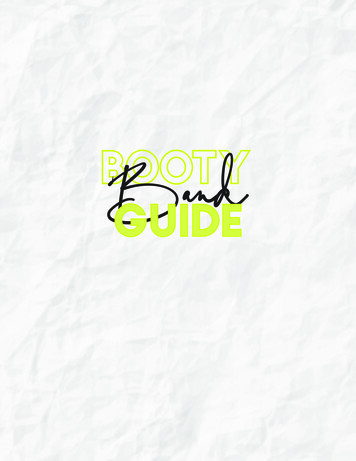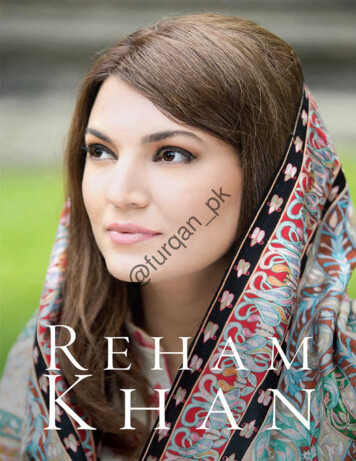
Transcription
pkanrqfu@
pkanrqfu@REHAMKHAN
Copyright Reham Khan 2018The Author asserts the moral right tobe identified as the author of this work.ISBN 978-191641-52-01Printed and bound in Great Britain.Published by SK Publishing Ltd 2018All rights reserved. No part of this publication may be reproduced, stored in a retrieval system, or transmittedin any form or by any means, electronic, mechanical, photocopying, recording or otherwise, without the priorpermission of the author.@furqanpkThis book is sold subject to the condition that it shall not, by way of trade or otherwise, be lent, resold, hiredout or otherwise circulated without the author’s prior consent in any form of binding or cover other than thatin which it is published and without a similar condition including this condition being imposed on thesubsequent purchaser.
anrqfu@AcknowledgementsPrefacePrologueChapter 1Chapter 2Chapter 3Chapter 4Chapter 5Chapter 6Chapter 7Chapter 8Chapter 9Chapter 10Chapter 11Chapter 12Chapter 13Chapter 14Chapter 15Chapter 16Chapter 17Chapter 18Chapter 19Chapter 20Chapter 21Chapter 22Chapter 23Chapter 24Chapter 25Chapter 26Chapter 27Chapter 28Chapter 29Chapter 30EpilogueAppendicesPhotographspkTable of Contents
AcknowledgementsI@furqanpkt is strange to write an acknowledgements section when there is hardly anyone to acknowledge. Thesad fact is that this was a mountain that I had to climb largely on my own. No one wanted to tell mystory. Everyone who took an interest was in it for other reasons. Eventually, even those who wanted tohelp found that they could not. There were too many complications. There were obstacles andopponents at every turn. This was too much and too scary for just about everyone. With so many thingsworking against me, I probably should have just given up. But I did not. And I only needed one sourceof help.This book would never have been completed had it not been for Sahir, my son. I would never havemanaged to organise it all by myself. We worked on it together, compiling passage after passage, chapterafter chapter. It was a mammoth task. But we did it.In bringing this book to you, Sahir was my only support. He kept me motivated and forced me towork harder. We would often stay up all night to get the job done. Sahir became an expert in editing,publishing, designing and countless other things. He single-handedly achieved what huge teams cannot.He displayed utter professionalism, and his tolerance of my totally unreasonable panic attacks waslegendary.Even Sahir’s friends were supportive. Instead of complaining that he had no time to hang out, theygot involved and gave us valuable feedback. These people offered more support than most people in mylife ever have. I will not forget that.Despite everything, this book was written. My story is ready to be told.
PrefaceT@furqanpkhis is said to be ‘the much-awaited book’. Awaited by those who fear what it will expose. Awaitedby those who think it might just help their own political careers.There will be many in the media who pick up this book simply to get some juicy content for theirshows. But that is not why I write it.Why do I write this book? Is it for revenge against certain people I have known? Is it to set therecord straight? Is it to prove my innocence and incriminate others?It is none of the above. It is the account of a public figure who also happens to be a human being,something the world seems to overlook.This is the account of a mother who is responsible for three children of her own, as well asthousands of children who have no mother at all (another fact people seem keen to forget).This is the account of a young girl who grew up very quickly. This is a story for my two daughters; astory that will tell them that the happiness they are looking for is within them. You are responsible forthe smile on your face.This is a story for my son: If you love a woman, she will give you her life. But if you hurt a woman,she will leave you for a much better life.This is a story for those out there who think that there is no point going on anymore. To you I saythis: You will see that there is every reason to get up, no matter how many times someone pushes you tothe ground.
PrologueT he pine door burst open.@furqanpkA tall man barged in. He saw the mother with the young child clinging to her under the crisp whitelinens. The thin, cruel lips were pursed tightly together on his long face. He stripped the duvet from thebed and grabbed the woman’s thin wrists. In one swift movement, he dragged her to the floor. She fellto her knees. The little child cried out in terror. As the woman got up, she heard the familiar barrage ofabusive words. But she realized that she was not afraid anymore.The man did what he usually did, moving forward to punch her in the chest repeatedly. She heardherself scream for the first time in years. The man stepped back, as if surprised by any form ofretaliation. The woman regained her bearings and stood in front of him. She threatened to call thepolice if he hit her again, but it had been twelve years and she had never reported him. She heard hislaugh and screamed again, this time for her son.“Sahir!!!”As the man advanced towards her again, she warned him that she would call 999.“Oh really! Let’s see you do it then,” he jeered.He knew her inside out. He thought she did not have the courage to go through with it. He had herright where he wanted her. His wife had thought about leaving him every day for over twelve years. Shewould be certain by Friday. But as he left for work on Monday, she’d talk herself out of it. After all, itwasn’t the sort of thing ladies did. How would her mother face society? What would people say?She didn’t look like a victim. Her lipstick was always in place. Her smile was always ready. She wasyoung, confident and full of life. She had everything a woman could want. She lived in a five-bedroomhouse with en-suite bathrooms, a central staircase, four reception rooms, and a large conservatory. Notto mention the two luxury cars parked outside, one with her name on it. It was the perfect everything.She looked perfect. The house looked perfect. Her children looked perfect. They looked perfecttogether. But the reality was anything but perfect.That night had hardly been the first time. There had been many times when a scene from a cheapsoap opera was enacted in the country home. But something was different tonight. This woman was notthe young teenager he had married long ago. This woman had changed. She ran out of the room and hechased her across the house and into her daughter’s room. With the phone in her hand and adrenalinecoursing through her, the woman made her move. She didn’t even notice the toys on the floor digginginto her feet as she dialled the number she had wanted to call for so long.The man stood in the doorway and stared. The kids stood petrified, looking from one adult to theother. From the look on his face, it seemed he didn’t believe her. He seemed certain she was bluffing.But then he heard her say, “Police. The Willows, South Street, North Kelsey”.He turned on his heel and disappeared. She locked the door behind him and sat down on the fairyprinted duvet of her daughter’s bed. Her three kids huddled around her. She felt her bony chest hurtwhere he had punched her. Punching her straight in the chest was his style, almost a signature move.She could always sense his cowardice; how he would aim like a little boy who was scared. It was almostas if he expected a punch back. But she never retaliated. She barely even managed a whimper most of thetime.She remembered how he’d pinned her before, as he had many times. He was laughing as he forced
himself on her.“You are so pathetic!” he jeered. “Why don’t you call 999? You can’t even spit on me”.A single tear slid from her eye as she turned her head to one side. The only noise in the room was thebanging of her head as it hit the headboard, over and over again. It was as if she was not human. She wasbut a vessel with a pole being driven into her, repeatedly. She was detached in that moment, as if shewasn’t even there. Her soul was numb. But tonight, she felt it. The punch. The insult. The helplessness.She felt it all and she was shivering with anger and with fear.She had always been a perfect prisoner. Why even bother retaliating? What was the point? Whowould hear her? Who would come to save her?No one ever did.§@furqanpkIt was a cold night in 2005. Christmas was only a few weeks away and I had finally taken the firststep. I had made the call. But I was shocked at what I’d done. The kids and I remained quiet until thedoorbell rang. I heard my husband’s footsteps on the wooden landing and then on the stairs. I lookedout and saw him walking towards the door. In the minutes after the phone call, he had changed out ofthe denims that he lived in, put on a suit and combed his hair back neatly. He looked every bit theconsultant psychiatrist he was paid to be by the NHS. I stared in disbelief at this transformation. I sawtwo police officers at the door. They asked him about the phone call. I slowly and awkwardly walkeddown the stairs. One policeman took my husband to the main lounge while the other one took me tothe smaller living room. He shut the door and started by asking me my name. I smiled. It probablywasn’t appropriate to the situation but it was what I always did. It’s what I’d done my whole life. As Ismiled and joked I thought to myself, ‘Who is going to believe your story? You look fine. You don’tlook abused’.But they believed me. They saw me shivering, despite my smile. The police officer’s eyes were kind.He asked me general questions. He asked if I had family and friends. The other officer joined us andsaid that the doctor had insisted that he had only manhandled his wife, and not hit her. The doctor wasasked to leave the property with the police and stay away for 48 hours.A few weeks later, the same officer, Martin, came over to check on me. He told me how they weretrained to pick up on subtle signs. He had noticed how Doctor Ijaz Rehman, my husband, had insistedon bringing him a cup of coffee in a mug that said ‘World’s Greatest Dad’ on it. I smiled and told himthat it was actually a mug that had been left by a friend.For a woman with no support, the greatest fear is the increase in risk after domestic violence isreported. I was terrified of the consequences, and by the prospect of Ijaz returning to us. This was astart; they had taken him away and told him not to return for 48 hours. But I resolved to never behelpless again.It had taken a month of special prayers (Istikhara) to build up this resolve and courage. People oftensay to me, “But you are brave so it was easy for you”. But I remember how scared I was until that firststep. I guess it is easy to confuse cowardly acts taken with confidence and brave acts taken with fear. Youbecome brave by doing brave acts.I was a 32-year-old mother to three young kids, with no money, friends, or family. I had no jobprospects and no man ready to step in and rescue me. But I had one thing which is far more importantthan all of that. I had hope.
Chapter 1L ife started off in Libya. I remember Libya as a happy place, characterised by the smell of fresh-baked@furqanpkbaguettes, khubz, and huge Egyptian chapattis. This was a time when everyone had nothing but praisefor the rather charismatic and revered Muammar Gaddafi. He was considered quite a heartthrob by theladies (my mother’s diary would open to a photograph of him). He was known for throwing outwesterners on a whim, an action which would result in educated people like my mother filling in forEnglish teaching positions, and even English radio stations. There were frequent mentions of his erratictemperament, but this was a man seen by most of those he was ruling as a strong leader; one who stoodup to bullying and had miraculously survived numerous assassination attempts.My parents, like many of my mother’s family, left Pakistan in the late sixties. My dad was a youngENT surgeon who chose to move to Libya. My mother, ever the perfectionist, had already completedher family by then; she had a boy and a girl. But then I happened. Perhaps being born in the GreatSahara has something to do with my ability to persevere and survive hardship. My mother certainlybelieved that I was a true Bedouin. I was born in the beautiful Mediterranean town of Ajdabia, in NorthWestern Libya. We later moved to Benghazi. The society I recall was liberal. Women in traditionaloutfits walked side-by-side with ladies in skirts. In fact, the women had a very Parisian fashion sense,with face-nets, berets, and fishnet stockings all the rage.Home life was peaceful and happy. Mummy and Daddy were happy. She would sing while cooking.I would help with the dishes. Surprisingly, I have a clear memory going back to when I was about fouryears old, with some flashes from when I was even younger, boosted by family albums of happy andprosperous times. Indians and Pakistanis enjoyed well-paid positions and a vibrant social life. Iremember my mother being quite the fashionista: whether it was Western suits or Indian sarees, she wasalways beautifully elegant. She cut a striking picture. My sister, although a teenager at the time, was alsovery fashion-conscious, from fake eyelashes to huge flappers. My father was very fond of takingphotographs of his beautiful wife and his daughters. I would never pose though. In every familyphotograph, my head would be turned the other way. My defiant, free-spirited nature was always rightthere.My independent nature was something of a concern for my parents at times. As a two-year-old inour flat in Ajdabia, I decided one day that I was old enough to have my privacy. I decided to lock thebathroom door behind me, despite instructions not to do so. Unfortunately, locking the door for atoddler is a lot easier than opening it. I must have spent an awfully long time in there as I remember anabnormally long, black bathtub. However, I waited calmly, without even a whimper, while the familypanicked outside.Apparently, I was an unusual baby in that I never cried. I find it hard to believe that but everyoneswears by it. I was apparently even taken to doctors to see if there was something wrong with me. I wasprobably just a quieter baby than my older brother, who cried enough to wake the neighbours up. Thewhole house would spend the evenings rocking and singing him to sleep. The favourite bedtime songwas ‘Munir Khan bunay ga sadr–i-Pakistan’ (Munir Khan will become President of Pakistan).I stayed calm that day too, until eventually a young girl from next-door was recruited to climb inthrough the skylight and open the door from the inside. My parents were relieved, and I wasn’t scolded.In fact, I only remember my mother being angry at me on two occasions at most. She didn’t need to get
@furqanpkangry. She could simply give me or my brother the look, and we would not step out of line. Her weaponof choice for getting us to behave was “I will not speak to you”. For me and my brother, that was like adeath sentence. It was the end of the world. It was an effective instrument of torture to get us to drinkendless glasses of milk or excel in school.With my own children, I found that my sudden, quiet disappointment worked so much better thanpersistent nagging or shouting, which generally falls on deaf ears. A talkative woman suddenly goingquiet is a very clear sign of danger. I developed this mechanism to avoid saying anything hurtful. Bysimply allowing myself a few minutes to calm down, I would then be able to return and talk rationallyabout almost any issue. The kids could immediately recognise and correct their behaviour. Uglyarguments were never my style. Whether it was work issues or relationship issues, it was my style to getinto the car and drive away and get it out of my system alone, without witnesses.My father was a gentle soul, and never even so much as looked at us sternly. I was very much daddy’sgirl. Throughout his lifetime, I was his partner-in-crime when it came to eating out. My mother alwaysinsisted on very bland, healthy food at home, so Daddy and I would have lunch and ice-cream beforecoming home, but would always be caught because of the telltale signs of ice-cream on my schooluniform. My father was popular in Libya too. I recall him being treated with utmost respect at work andin general. There was generally a respect for doctors, and the mere mention of his profession wouldresult in people at car repair shops refusing to take money.The Libyans were a loving lot, and fond of showering people with gifts. I remember severalincidents where a reluctance to accept gifts was met with shock and genuinely hurt feelings. I remembermy mother being asked to fill in as a substitute teacher in times when American or British teachers werethrown out. Her students kept bringing expensive gifts that my mother would refuse, resulting in tears.It wasn’t only materially that Libyans expressed their love. Our landlords lived in the same compoundas our family and an Indian family. They were not only good landlords but treated us like family. Onone occasion, my mum came home to find my sister covered in hives and blisters. Apparently, thelandlady had been waxing her own daughters with the traditional halawa wax (sugaring), and sinceSweety was visiting, she got the works too.Our other next-door neighbours were a Hindu family. The parents were both doctors and they hadtwo boys. An aya (nanny) had been brought from India to look after the boys. My independent streakwas once again visible as I refused to be kept locked away. One morning in an emergency, my parentsleft me at home alone for less than half an hour. When Tony and Joy from next door came over to play,they found me locked in the house. Not one to give up, I asked the younger one, Joy, who was about twoyears old, to crawl under the Venetian style blinds a couple of times to prise them open enough for meto slide out from underneath it. Mission accomplished, we went over to their home to play. We had notintended to stay for very long but soon became so engrossed with the train sets and the Kiri cheesesandwiches that we forgot to go back to my place. Meanwhile, my parents were having the scare of theirlives trying to find their missing child. They had checked everywhere except with the next-doorneighbours.Although our Hindu neighbours were secular, I remember the aya taking our arti and applying tilakafter her prayers. In addition to teaching us the Quran herself, my mother had taught us about all worldreligions. My own family were deeply religious Sunni Muslims. Both sides of my family weredescendants of Ghurgushtan, the third son of Qais Abdur Rashid, the legendary father of the Pashtunswho brought Islam to our region. Qais is said to have travelled to Medina and been introduced byGeneral Khalid bin Waleed to the Prophet Mohammad (PBUH). The holy Prophet (PBUH) is
@furqanpkbelieved to have given Qais the name Abdul Rashid, the ‘servant of the right-minded’. It is widelybelieved that Qais married Khalid bin Waleed’s daughter, Sara, and returned to his birthplace of Zhobon the border between Baluchistan and Khyber Pukhtunkwa. His grave is in the Suleiman Mountains,also called Qais Baba Ghar.My mother’s family are Pannees, an Afghan tribe. They came even before the first Pashtun ruler ofIndia, Behlol Lodhi, arrived in the region. They were asked by Lodhi to support him. They were horseand camel breeders at the time. My father’s tribe, the Swatis (originally from Shalman in Afghanistan),came to Swat in the time of Mahmud Ghauri. Later, with Jalal Baba, they ousted the Turks fromHazara at the start of seventeenth century. Swatis have occupied the hills and plains ever since, and arethe biggest land-owning group of the Mansehra and Battagram districts. My dad’s side is LughmaniSwati, mainly settled in Baffa, Balakot, and Battagram. This Pashto speaking belt is very religious.My father’s family had a tradition of teaching Quran and Tafseer. However, being bound to pureIslamic teachings never meant bigotry or insensitivity to other religions or sects. All the women in thefamily were highly educated. My father’s sisters were educated at Aligarh College in Delhi, before thepartition of India into two states. It took two days by train from our village in Baffa in the North ofKhyber Pukhtunkhwa. Both worked as educationists even before they were married. This progressiveattitude meant the children in our family grew up in an environment that was neither bigoted norintolerant.To me, acceptance always came naturally. I was in for a shock years later when an older Pakistanilady would say to me, “It’s bad enough when they go off with white boyfriends, but how can they gowith a black man?” Such attitudes were nowhere near as uncommon as they should have been. Despitebeing rather dark ourselves, our societies were horribly racist towards blacks and dark-skinned people inour own communities, and perhaps still are. Even my own grandmother, who was a pale redhead herself,would complain if anyone got a touch of a tan or, God forbid, was born dark.My ability to speak several languages developed through my exposure to several cultures and racesfrom a young age. As the light-complexioned, rather talkative young child of a popular couple, I wasspoiled by all in my parents’ social circle in the Pakistani communities of Benghazi. The doting adultswould teach me songs and jokes, and I would soak it all up. There are tape recordings of me as a threeyear-old, telling jokes in Punjabi about Sardars (Sikhs), learned from Indian aunties. Punjabi was notmy mother tongue, but a clear reminder of how many influences I had. My ability to memorise numbersand verses was enhanced by my mum, who had impressive general knowledge and was a huge fan ofpoetry. As an eight-year-old, I could recite Shikwa and Jawabi-i-shikwa by Dr Iqbal, the Ulysses of Urdupoetry.It seems that someone had also fed me racist and religious bigotry at some point, as I vividlyremember once making derogatory comments about Hindu gods while playing with my next-doorneighbours. I didn’t know what I was saying. My mother gently corrected me by telling bedtime storiesof the Prophet Mohammad (PBUH) and his perseverance, even when attacked with stones by his ownpeople.As a child I required little supervision or rest. I was happy playing on my own with plasticine, oroutside on bikes with the boys next-door. There wasn’t much in the way of TV viewing in my life, but Ido remember being enthralled by the film The Message, based on the life of our final prophet HazratMohammad (PBUH). Night after night, I would watch it alone in the dining room where the TV was. Icouldn’t have been older than four or five. I don’t remember watching standard TV or cartoons until Iwas a teenager. I was lucky to have an imagination, as well as parents who never used the TV as a
@furqanpkbabysitter. In fact, very few people can claim that they were as privileged as I was when it came to havingattentive parents. My multi-talented mother was certainly an inspiration, and she gave us a head startover other children. Birthdays were large, elaborate affairs, and my mother baked the most fantasticcakes imaginable. Everything she did, she did to perfection. These high standards were also expected ofus. Not disappointing her was what we cared about most. We would all grow out of it eventually, andshe would finally come to accept that life is not about being perfect. To be imperfect is to be unique.Money was good, and the quality of life was even better. If it hadn’t been for my older sister growingup so quickly, my parents would have had no intention of returning. But, like it is with most expats,getting the daughter married off was a major motivating factor. My father wanted to move to England,but mum only liked it as a shopping destination. She persuaded him to move back to Pakistan instead.One of my prized possessions in Libya was a shoebox of arts and crafts. It had bits and bobs and allsorts, with green shining foil crescents that I had cut out. In my excitement for our move, I had used thepieces of green and white to make the Pakistani flag. However, despite promises that it had been packedtoo, it was left behind. I could not tolerate that I had been lied to. I remember driving my mother madwith my persistent nagging to find those materials again. There is a strict code of conduct amongPashtuns (known as Pukhunwali) that ties us to high standards of hospitality and friendship. Fordeception, it advocates a fitting revenge. It may have been a small thing but, true to my roots, I did notforgive my parents for years for deceiving me.Life in Pakistan should have been perfect. My mother had built her dream home in the city ofPeshawar, right next door to the sister she had missed so much. This was the city where she had gone tocollege. But things were different now under the military dictatorship of Zia ul Haq. His involvementin the American war against the USSR in Afghanistan had literally changed the scenery. Afghanrefugees were everywhere. For the elite, these poor people were destroying the peace of their leafysuburbs. We conveniently forgot that they were homeless because of us Pakistanis fighting theAmerican war in Afghanistan. I remember buying cheese and oil from CSD (military stores) clearlystamped ‘For Afghan Refugees - Not for resale’. I also found a lovely friend in an Afghan refugee calledRoohia. She told me the horrific story of how they had escaped the bombing in the middle of the night,and how the cash they stuffed into their socks was destroyed as they waded through water to reachsafety.Meanwhile, my mum and dad would have their only argument ever in front of me over the height ofthe boundary wall. My mother had built a 5-foot wall with decorative gaps in the middle. But theculture of the 80s was tilting more towards purdah. My mother eventually had to give in, and the wallwas raised to a height of nine feet around the entire property, which had become the norm in thosedays. She brought it up resentfully every so often for years to come. She felt that her home had beenturned into an ugly oppressive fort.I had to deal with my own mini culture shock. Like many expat children, I refused to eat the localproduce and dairy because of the unfamiliar smell and appearance. My weight loss was a huge concernfor my family. But even to a child the differences between prosperous Libya and regressive Pakistanwere so obvious. In fact, one of the first observations I had made about the country that my parents hadmissed so much was, “Your Pakistan is so toota phoota [broken]”.The Pakistan that they had returned to was crumbling, but the cracks were just beginning to appear.§We had left my shiny foil stars behind in Libya to come over to be with my older sister and brother,
@furqanpkwho had been sent to live with my mum’s parents earlier. They had been in boarding schools in Malta,and as my sister blossomed into a stunning teenager, the decision to send her back to Pakistan wasmade. My brother was also packed off to live with my mother’s parents. The move from Irish Catholicschooling straight into Pakistani culture meant the youngsters had to do a lot of unlearning, and a lot ofquick cramming of new rules.One major difference between Western and Eastern societies can be found in the terminology forclose family members. In our society, there are several unique words that are used to display ouraffection to each other that go beyond the straightforward English terms of brother, sister, aunt, uncle,grandmother, grandfather, etc. We are accustomed to adding these kinds of terms to the end ofeverything, so that everyone receives this kind of respect. People we don’t even know will havesomething simple like Sahab or Sahiba added to the end of their name (meaning sir/ma’am or Mr/Mrs).But for those we know and love, many more terms become available to us. Our people have ended upwith a lot of different names for each other, borne out of respect and love. The suffix –jee (oralternatively –jaan) is a form of endearment reserved for those we hold dear. In fact, we are taught torefer to grown-ups as auntie or uncle even if they are not blood relatives.There are several other terms too, like chacha, chachi, taya, tayi, appa, appi, bhai, bhabhi, etc. WhileI am a khala to my sisters’s children, I am a phuphi to my brother’s children, while my brother is amamoo to our kids (and his wife a mami). The intricate system is further complicated by the fact thatwe will address random people as bhai or baji (meaning brother or sister) as a sign of respect. It wassomething my kids would find overwhelming but amusing. Major exceptions to this complicated set oftitles were my parents, who both took ownership of more distinctive and easy nicknames. My father wasknown as Daddy to most of us, while my mother took on Barimummy (meaning the Big Mummy),inheriting the moniker from her own mother. Perhaps they were trying to be trendier than virtuallyeveryone else in the world by not accepting some variation of grandfather and grandmother.My grandfather, Dr Sher Bahadur Khan Pannee (who shared a striking resemblance with Presidentfield marshal General Ayub Khan) was considered a rather eligible bachelor, and was fondly known toall as Khanjee. He was the only son of an affluent Pashtun family, and a direct descendant of the MunirKhani tribe. His light complexion and hazel eyes added to his desirability. The local families were to bedisappointed however, as the young doctor chose to marry a beautiful girl from Kasur, in Punjab. Shewas also from a Pashtun family belonging to the tribe of Batakzai from Kandahar, who had settled inthe small hamlet of Kot Haleem Khan in Kasur. Everyone came to know her as Beejee.The very pale-skinned Beejee of the Punjab had a classic oval face
the smile on your face. This is a story for my son: If you love a woman, she will give you her life. But if you hurt a woman, . moving forward to punch her in the chest repeatedly. She heard herself scream for the first time in years. The man stepped back, as if surprised by any form of . the greatest fear is the increase in risk after .
